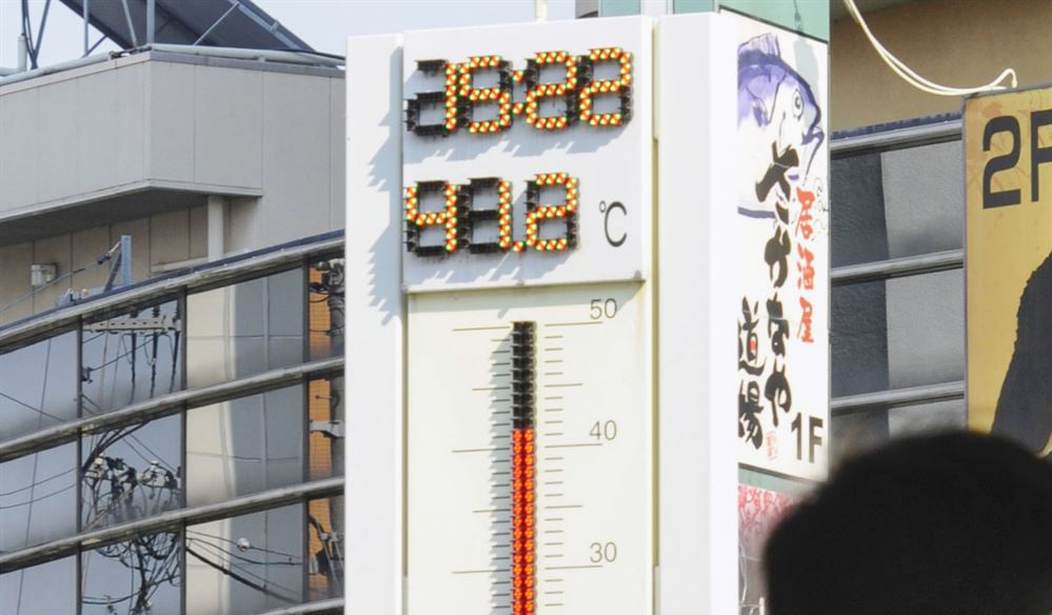The drivel from air-conditioned mainstream media newsrooms has reached new levels of guffaw with the “shocking” headlines that the Fourth of July was the hottest day on Earth in “as many as 125,000 years” – breaking a record set on July 3.
Hmmm. Really? Or is this just hype to avoid mentioning the shortfall of patriotic fireworks, replaced by drones across much of the Home of the Brave (not so much).
Here’s what we know IS true. In many places, including central Texas, it was HOT on July 4. Scientists do note that El Nino has arrived, bringing with it higher temperatures for the next several months. Other scientists quietly mentioned that the recent eruption of the Hunga Tonga–Hunga Ha’apai submarine volcano, which sent ash 36 miles above sea level, “could warm our atmosphere in the future.”
Here’s what we also know. This “hottest day” is an estimate based on a computer modeling system that has only been used since 1979. Estimates of prior global average temperature are based on more estimates - of tree rings and ice cores, and on “instrument-based global temperature records.” The simple fact is that this is pretty flimsy evidence for any courtroom.
According to “defense attorney” Steve Milloy of JunkScience.com, the recorded average global temperature of 62.6o F was derived from the University of Maine’s Climate Reanalyzer, which “relies on a mix of satellite temperature data and computer-model guesstimation to calculate estimates of temperature.”
Milloy, who scoffs at the idea that calculated estimates of current temperatures can be fairly compared with guesses about specific global temperatures long before recorded history, is even less sanguine about modern-day temperature “reporting.” He notes that 96 percent of U.S. temperature stations reportedly produce corrupted data, and 92 percent have a margin of error of nearly 2o F.
Recommended
Headlines in Austin, Texas, for example, screamed that July 2022 was “the hottest July on record,” even hotter than in 2011, which saw a record 90 days of highs of at least 100o F. Austin has only seen four years in the past century without at least one 100-degree day, the city has grown from about 40,000 people in 1923 to about 1 million today (with 2.3 million in the metro area), ensuring a significant urban heat island effect.
Scientists say that urban heat islands can add 1 to 7 degrees of daytime heat and up to 5 degrees of nighttime heat to what would otherwise be the local temperature. Austin has a significant greenbelt, but downtown areas with rapidly increasing concrete and steel and traffic feel the pain. And that, not carbon dioxide, ought to be the real target for those concerned about heat’s impact on humanity, given that 70 percent of humanity is predicted to be living in cities by 2050.
While on the topic, we learned that NBC meteorologist Angie Lassman, citing a 2022 United Nations climate report, claimed that parts of Georgia, Alabama, Louisiana, and California (but not Texas?) will become “less suitable” for human habitation by 2070.
Joe Fryer (aptly named?), guest hosting on NBC’s Sunday "Today" show, had claimed that “the human body simply can’t handle these levels of heat and will go into heat stress,” and Lassman chirped that Fryer’s concerns are "actually, probably closer than you might think."
While many agree that much of California is already “unsuitable for human habitation” (for reasons other than weather), Lassman’s statement has to have come from either ignorance or bias (that many would call racist). Nearly the entire global south (except in mountainous areas) has much higher average annual temperatures than nearly anywhere in the United States (excepting a few southwestern desert hotspots).
The American south may see many hot days in summer, and, yes, the highest temperature on record was 134o F in Death Valley (in 1913), but countries like Qatar, Libya, Mali, and even Mexico are much hotter – and yet millions of people live in these nations. India, with over a billion people, has an average daily high temperature of 87.5o F. Does Lassman believe India is uninhabitable?
Believe it or not, people also survive in the very cold climates in such nations as Canada and Russia, where the average daily temperature overall is below freezing, and in Sweden, Norway, Tajikistan, Sweden, and Estonia (among others).
These days, more Americans than ever are flocking to those “soon to be uninhabitable” southern states from northern cities – though many cite local politics, not climate, as their chief reason. That is, people are fleeing high taxes, overregulation, and poor job prospects all too often exacerbated by political decisions.
But isn’t that a major reason also why media personalities (guided by unseen influencers) choose to discourage people from moving south to states that offer greater opportunity and personal freedom? Where governors listen to citizens more than to “experts”? Where fewer fear “climate change,” as demonstrated by the voting patterns of their elected representatives?
As Milloy says, “Average global temperature is a concept invented by and for the global-warming hypothesis. It is more a political concept than a scientific one.”
And we are well aware of the political goals of those pushing the climate fear agenda.
Duggan Flanakin is a senior policy analyst at the Committee For A Constructive Tomorrow who writes on a wide variety of public policy issues.

























Join the conversation as a VIP Member